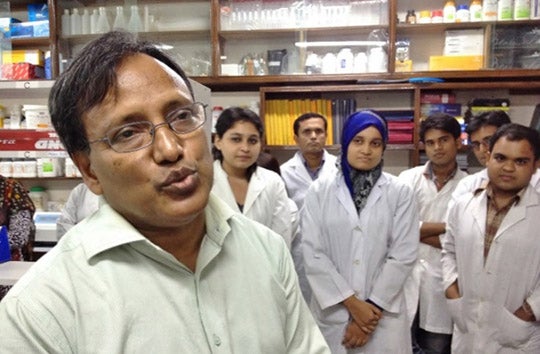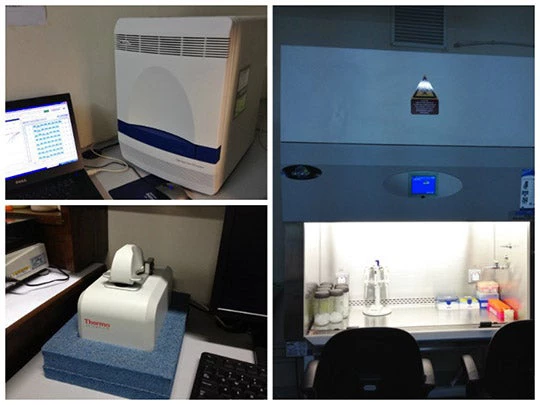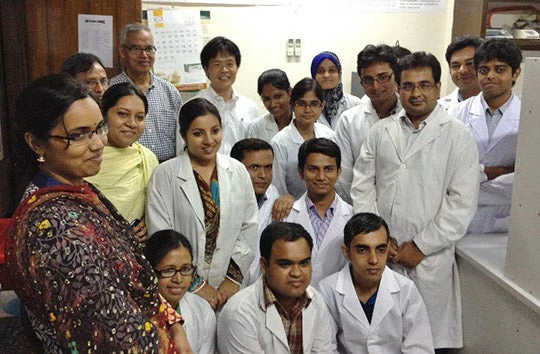
Vaccination is one of the effective strategies to prevent FMD infection. Due to a high rate of mutation in FMD virus, there is an urgent need for the development of safe and effective vaccines for FMD.
“Bangladesh spends a lot of money to import FMD vaccines – but these are produced for foreign strains of FMD viruses, and they are ineffective against the virus strains circulating in Bangladesh. We need to have vaccine development capacity of our own,” says Prof. Anwar Hossain, Department of Microbiology of University of Dhaka and Manager of the sub-project titled, Foot and Mouth Disease in Bangladesh: Genome Analysis and Vaccine Development Project.

Prof. Anwar’s sub-project was awarded a competitive research grant of BDT 23.7 million (about US 304,000) from the Higher Education Quality Enhancement Project (HEQEP). His project is conducting studies to determine variation in FMD virus of Bangladesh origin and developing appropriate methods of prevention against FMD viruses. Using the fund, Prof. Anwar and his team upgraded their laboratory with essential modern scientific equipment such as real-time Polymerase Chain Reaction (PCR) machine to read DNA sequences and bio-safety cabinet together with a lot of indispensable laboratory consumables.
Since its inception in 2011, the sub-project has made significant achievements on their research work. These include completion of epidemiological study of serotype and lineage of FMD viruses, isolation and genome-wide analysis of FMD virus in Bangladesh, and publishing papers in international academic journals.

The ultimate goal of the sub-project is to develop and make available FMD virus vaccines for livestock farmers in Bangladesh at affordable prices. To achieve this, Prof. Anwar has established collaborative partnership with a Bangladeshi pharmaceutical company.
Prof. Anwar explained his vision and experience of working with a private company. “Drug companies are very interested in our research outputs. We can isolate viruses and develop ‘seeds’ of vaccines through genome analysis and epitope designing, and the company can field test and manufacture vaccine products. The sub-project will soon sign a MoU with a drug company to develop vaccine products for FMD of Bangladesh origin. We hope the new vaccines will contribute to controlling FMD outbreaks in our country in near future.”
HEQEP is now launching a new window of funding specifically designed to lay the foundations for building an innovation ecosystem in Bangladesh and promote university-industry collaborations. The new window will create awareness on market relevance of research among the academics and help them turn knowledge generated through research into practical solutions and new products. The new window will soon be assisting nascent partnerships like Prof. Anwar’s to create innovations and bring about greater impacts on the development of the country.
Some publications published with funding from HEQEP.
- Nandi, S. P., Rahman, M. Z., Momtaz, S., Sultana, M., & Hossain, M. A. (2013). Emergence and Distribution of Foot‐and‐Mouth Disease Virus Serotype A and O in Bangladesh. Transboundary and emerging diseases.
- Sultana, M., Siddique, M. A., Momtaz, S., Rahman, A., Ullah, H., Nandi, S. P., & Hossain, M. A. (2014). Complete genome sequence of foot-and-mouth disease virus serotype O isolated from Bangladesh. Genome announcements,2(1), e01253-13.
- Ullah H, Siddique M, Sultana M, Anwar Hossain M. (2014). Complete genome sequence of foot-and-mouth disease virus type A circulating in Bangladesh. Genome Announcement 2(3)
- Alam, S. S., Amin, R., Rahman, M. Z., Hossain, M. A., & Sultana, M. (2013). Antigenic heterogeneity of capsid protein VP1 in foot-and-mouth disease virus (FMDV) serotype Asia 1. Advances and applications in bioinformatics and chemistry, 6, 37.
- Samina, M., Rahman, A., Sultana, M., Hossain M.A. (2014). Evolutionary Analysis and Prediction of Peptide Vaccine Candidate for Foot-and-Mouth-Disease Virus Type A and O in Bangladesh (accepted for publication in Evolutionary Bioinformatics)


Join the Conversation